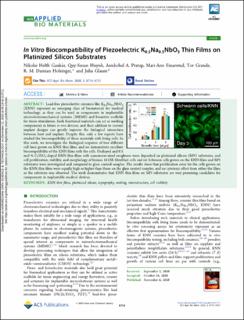| dc.contributor.author | Gaukås, Nikolai Helth | |
| dc.contributor.author | Huynh, Quy-Susan | |
| dc.contributor.author | Pratap, Anishchal A. | |
| dc.contributor.author | Einarsrud, Mari-Ann | |
| dc.contributor.author | Grande, Tor | |
| dc.contributor.author | Holsinger, R. M. Damian | |
| dc.contributor.author | Glaum, Julia | |
| dc.date.accessioned | 2021-01-08T12:54:45Z | |
| dc.date.available | 2021-01-08T12:54:45Z | |
| dc.date.created | 2020-12-13T22:42:34Z | |
| dc.date.issued | 2020 | |
| dc.identifier.citation | ACS Applied Bio Materials (AABM). 2020, 3 8714-8721. | en_US |
| dc.identifier.issn | 2576-6422 | |
| dc.identifier.uri | https://hdl.handle.net/11250/2722205 | |
| dc.description.abstract | Lead-free piezoelectric ceramics like K0.5Na0.5NbO3 (KNN) represent an emerging class of biomaterials for medical technology, as they can be used as components in implantable microelectromechanical systems (MEMS) and bioactive scaffolds for tissue stimulation. Such functional materials can act as working components in future in vivo devices, and their addition to current implant designs can greatly improve the biological interaction between host and implant. Despite this, only a few reports have studied the biocompatibility of these materials with living cells. In this work, we investigate the biological response of two different cell lines grown on KNN thin films, and we demonstrate excellent biocompatibility of the KNN films with the cells. Undoped and 0.5 mol % CaTiO3-doped KNN thin films with nanometer-sized roughness were deposited on platinized silicon (SiPt) substrates, and cell proliferation, viability, and morphology of human 161BR fibroblast cells and rat Schwann cells grown on the KNN films and SiPt substrates were investigated and compared to glass control samples. The results show that proliferation rates for the cells grown on the KNN thin films were equally high or higher than those on the glass control samples, and no cytotoxic effect from either the films or the substrate was observed. The work demonstrates that KNN thin films on SiPt substrates are very promising candidates for components in implantable medical devices | en_US |
| dc.language.iso | eng | en_US |
| dc.publisher | ACS Publication | en_US |
| dc.rights | Navngivelse 4.0 Internasjonal | * |
| dc.rights.uri | http://creativecommons.org/licenses/by/4.0/deed.no | * |
| dc.title | In Vitro Biocompatibility of Piezoelectric K<inf>0.5</inf>Na<inf>0.5</inf>NbO<inf>3</inf>Thin Films on Platinized Silicon Substrates | en_US |
| dc.type | Peer reviewed | en_US |
| dc.type | Journal article | en_US |
| dc.description.version | publishedVersion | en_US |
| dc.source.pagenumber | 8714-8721 | en_US |
| dc.source.volume | 3 | en_US |
| dc.source.journal | ACS Applied Bio Materials (AABM) | en_US |
| dc.identifier.doi | 10.1021/acsabm.0c01111 | |
| dc.identifier.cristin | 1859266 | |
| dc.relation.project | Norges forskningsråd: 250098 | en_US |
| dc.relation.project | Norges forskningsråd: 250184 | en_US |
| dc.relation.project | Norges forskningsråd: 245963/F50 | en_US |
| dc.description.localcode | Copyright © 2020 American Chemical Society. This is an open access article published under a Creative Commons Attribution (CC-BY) License, which permits unrestricted use, distribution and reproduction in any medium, provided the author and source are cited. | en_US |
| cristin.ispublished | true | |
| cristin.fulltext | original | |
| cristin.qualitycode | 1 | |

